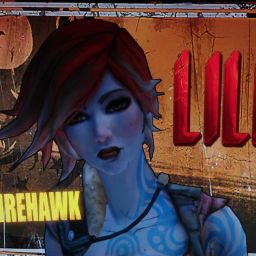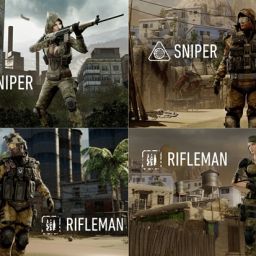by Kristin Bezio

And I love it.
With that little fangirl rant out of the way…
Dishonored is a fantastic game. It’s a little bit Thief (Lookingglass Studios, 1998), a little bit Bioshock (Irrational, which is who Lookingglass Studios became, 2007), a little bit Assassin’s Creed (Ubisoft, 2006), and a whole lot of awesome. And Blink – just to beat the proverbial dead horse – is one of the primary reasons why. In fact, all the powers are pretty spiffy – even though there aren’t that many of them, in the grand scheme of game-powers. Blink, Dark Vision (lets you see people and plague rats through walls), Possession (lets you possess a plague rat or a people), Bend Time (lets you slow or stop time), Devouring Swarm (of plague rats), and Wind Power (knocks people over with wind).
Now I haven’t actually used the last two, but that’s because one of the play-styles you can choose in Dishonored is “non-lethal.” Yup. In a game all about assassinating people, you can choose to not kill anyone. Including weepers, who are the game’s plague-zombies. Or dogs. Or guards. (You can kill plague rats.) And you have to be careful not to leave anyone unconscious somewhere where marauding plague rats might find and devour them, because if it’s your fault that the person (or dog) got eaten, that counts as a kill.
I played “non-lethal.” It’s harder that way, certainly, as rushing into a room and blowing everything up is a much simpler, if messier, way of dealing with a room full of somewhat boorish guards. But it does transform the game from a more typical run-in-and-slash-and-shooter to a puzzle game, because if you aren’t going to kill all the guards, you need to figure out how to get behind them to choke them into unconsciousness, which can sometimes pose quite the logistical challenge.
What interests me the most, though, is that when you choose your play-style in Dishonored, you’re not being rewarded for the “ethical” decision (unlike in Bioshock, for instance, where you’re given teddy bears carrying all the tasty Adam you could ever want). Sure, you earn Clean Hands (achievement for not killing anyone), but you are also choosing not to earn any of the achievements that require you to kill. You’re deciding what kind of Corvo (the player-character) you’re going to be – whether you’re the type of bodyguard who doesn’t kill, only disables; whether you kill only when necessary; or whether you’re just going to slaughter civilians and guards indiscriminately (which admittedly seems like a lot of fun, and I intend to do on a second play-through).
And that’s one of the things I really like about Dishonored – you get to decide what kind of player you want to be, and what kind of person Corvo is. In fact, in a game with a largely predictable and two-dimensional narrative, Corvo only has depth and personality because the player comes to invest him with the characteristics of their own play-style. In that sense, Dishonored escapes the problem that many games have when you try to play “non-lethal” and your player-character is a hard-core bad-ass who cares nothing for the lives of others… or the opposite. Because Corvo has little in the way of personality, it can’t possibly contradict the fiction the player creates through their game-play.
That said, Dishonored is not a rich narrative experience, which is one more surprise this game had for me. I like a rich narrative experience. I’m a huge Bioware fan because Bioware games (Mass Effect and Dragon Age) are incredibly complex narratively speaking. Their characters are multidimensional, the narrative structure (which resembles a giant ball of very pretty twine) is so complex in terms of decision trees that I don’t even want to think about how much coffee the writers needed to string it all together. And I love those kinds of games. But I also love Dishonored, which is most definitely not one of them.
In essence, Dishonored makes up for its lack of narrative and complex characterization with incredibly sleek and smart game-play mechanics, what those of us in the academic gaming biz call its “ludonarrative.” The ludonarrative is what you as the player construct in the process of playing – and Dishonored gets that part of their game 100% right. It lets me create a Corvo explicitly through my game-play without imposing on me a personality or attitude that I didn’t choose for him. It uses mechanics to do what Bioware uses narrative to do, and Dishonored does it with style.
Dishonored has taken some flack – in particular, I’m thinking of Anita Sarkeesian’s tweet in October that “Many truly brilliant elements in the game #Dishonored, sadly representations of women are not among them. #Disappointing.” While there aren’t a lot of “positive” depictions of women, there also aren’t a lot of positive depictions of men, either, and Becky Chambers from The Mary Sue had a great response to it, saying that “Dishonored is a rare example of a game that is self-aware about such things, and it addresses the volatile issue of gender discrimination in a way that is both subtle and — dare I say — justifiable.” (http://www.themarysue.com/but-alas-she-is-a-woman-how-dishonored-uses-gender-roles-to-tell-a-story/)
Now, would I prefer to have both my narrative and my ludonarrative, and eat them both with frosting and some lovely chocolate sauce? Certainly I would, but there’s something to be said for the purity of Dishonored’s focus on ludics. I think in some ways trying to mix the two would actually become too rich, too multi-layered, and the elegance of the game’s ludonarrative would get lost… and that would be tragic. Because what makes Dishonored an amazing game is that rather than having a great story or interesting characters, it’s all game.





[…] Today I’m the guest poster over at The Learned Fangirl again, this time on Dishonored: “Blink: Dishonored, Ethical Play, and Why Not Killing People Can be So Much Fun.” […]
Welp, this made me buy Dishonored, and it is exactly as good as you describe it. I am nowhere nere the end (I hope), and there seems to be great incentives for replaying it a few times.
We talked earlier about aggression and maleness in games, and you mentioned that “what is this game teaching the predominantly male audience?”-thing. This, and the above thing about choosing to play the “ethical” way got me thinking: have you played “Spec Ops: The Line”? I recently bought it when it was really cheap on Steam, thinking it was just a desert-themed FPS, but it was much more than that. I won’t go into detail, and please don’t google it, as it is best to play it without any prior knowledge. I would LOVE to read your take on SO:TL. Especially if you do sort of a running commentary with your impressions. It’s a pretty short game, and the gameplay is pretty much on rails, but I died incredibly often. I have seen this game reviewed like that by a former US Marine, and it was interesting to say the least. If you give me your SteamID, I’ll buy it for you.
It’s on my list! I’ll move it up the queue a little. 🙂
Oh, brilliant! It is a good counterpoint to Dishonored. Or maybe not counterpoint, they say the same thing but in extremely different ways. I played on medium difficulty, but I’d almost recommend playing on the lowest setting, as most of the time I spent in game was reloading autosaves (there is no quicksave!). As I said, I would love to see your notes made during gameplay, as well as a final analysis. More than any other game, (trite cliché incoming) this is about the journey more than the goal.
I just finished Dishonored, playing as a clumsy homicidal asshole rather than sneaky pacifist. I think I murdered every person I could see, except for servant girls. (A man’s gotta have a code.) And I couldn’t bring myself to kill Daud either, he is the only one I spared. Call it professional courtesy. The ending was pretty dark, but at least the little empress likes me, which is the only thing that mattered. The Boatman’s disappointment in my murdering ways really made me sad.
Now I’m replaying it as a pacifist. I assume rats, fish and those acid belching things are OK to kill. And probably weepers, as they are dying anyway. Oh hey, here I go again with the rationalization for murder. Gonna try to avoid weepers. Sleep bolts and choke holds all the way. Wait, did you say I’m responsible for rat kills? Does this mean I also can’t rewire Walls of Light? Is it really my fault if… Well, I guess it is.